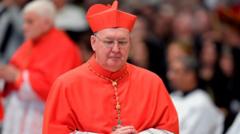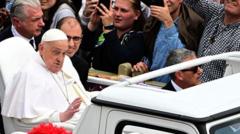Pope Francis died on April 21, 2025, leaving behind a transformative legacy characterized by a commitment to the marginalized and a robust call for environmental stewardship. As tributes pour in from around the globe, leaders and followers alike reflect on his contributions and the future direction of the Roman Catholic Church.
**Pope Francis: A Legacy of Humility and Global Advocacy Following His Passing**

**Pope Francis: A Legacy of Humility and Global Advocacy Following His Passing**
The world mourns the death of Pope Francis, whose inclusive message resonated across cultures and communities.
In the somber morning hours of April 21, 2025, news broke that Pope Francis had passed away at the age of 88 from complications related to a cerebral stroke. The Vatican's announcement revealed that, consistent with his humble character, Francis had requested a simple burial marked only with the inscription "Franciscus." His will, an eloquent reflection of a life dedicated to serving the poor and marginalized, underscores the values he championed throughout his 12-year papacy.
Just a day earlier, Pope Francis had been seen blessing the faithful in St. Peter’s Square, a sight that many mourners recounted with disbelief at the suddenness of his passing. “We saw him yesterday. We did not expect such a tragic ending,” lamented a tearful Marco Volpi, 69. In his absence, a palpable sense of loss filled St. Peter’s Square as crowds gathered to pay their respects, lighting candles and offering prayers.
Pope Francis was perhaps best known for using his position to advocate for issues such as migration, climate change, and social justice. His willingness to engage with the realities of the world and the suffering of people made him an influential leader among not just Catholics but many around the globe. Although he often faced opposition from conservative corners of the church, leaders and followers across various demographics celebrated him for challenging ecclesiastical norms and centralizing issues of morality—such as care for refugees and attention to climate change—within church doctrines.
World leaders have expressed their condolences and shared personal reflections on the influence of Pope Francis. President Trump remarked on his social media platform, highlighting a nuanced acknowledgment of the pontiff’s compassion for the less fortunate, despite their differing views on immigration. The intersection of Francis' advocacy for migrants with Trump’s policies encapsulates the broader tensions within contemporary political spheres.
In his native Argentina, citizens are mourning what many consider a deeply personal loss. As news of his death spread, churches across the nation began filling with grieving Catholics. “He was a good person, very humble. He always thought of the poor,” reflected Susana Perez, 67, recalling encounters with the pope during his time in Buenos Aires. To many Argentines, Francis represented a moment in history where their country was connected to the Vatican in a significant way.
Globally, leaders have celebrated his approach to issues like climate change, using his platform to draw attention to not only environmental degradation but also its disproportionate impact on the poorer nations. His encyclical, "Laudato Si," remains a cornerstone of contemporary Catholic environmental advocacy, framing climate issues as moral imperatives.
Within the papacy’s framework, the urgent matter now turns to the selection of his successor. As the world awaits, cardinals will be deliberating the direction of the church, caught between maintaining the welcoming spirit Francis embodied and the more traditional doctrines of his predecessors. This moment of transition could redefine the future path of the Roman Catholic Church, as they strive to address contemporary challenges while also grappling with Francis' vast legacy.
In sum, Pope Francis’ life and papacy serve as a reminder of the potential for compassion and humility in leadership. His call for a world rooted in social justice and respect for all continues to resonate profoundly, prompting a collective reflection on how to carry his message forward in the years to come.
Just a day earlier, Pope Francis had been seen blessing the faithful in St. Peter’s Square, a sight that many mourners recounted with disbelief at the suddenness of his passing. “We saw him yesterday. We did not expect such a tragic ending,” lamented a tearful Marco Volpi, 69. In his absence, a palpable sense of loss filled St. Peter’s Square as crowds gathered to pay their respects, lighting candles and offering prayers.
Pope Francis was perhaps best known for using his position to advocate for issues such as migration, climate change, and social justice. His willingness to engage with the realities of the world and the suffering of people made him an influential leader among not just Catholics but many around the globe. Although he often faced opposition from conservative corners of the church, leaders and followers across various demographics celebrated him for challenging ecclesiastical norms and centralizing issues of morality—such as care for refugees and attention to climate change—within church doctrines.
World leaders have expressed their condolences and shared personal reflections on the influence of Pope Francis. President Trump remarked on his social media platform, highlighting a nuanced acknowledgment of the pontiff’s compassion for the less fortunate, despite their differing views on immigration. The intersection of Francis' advocacy for migrants with Trump’s policies encapsulates the broader tensions within contemporary political spheres.
In his native Argentina, citizens are mourning what many consider a deeply personal loss. As news of his death spread, churches across the nation began filling with grieving Catholics. “He was a good person, very humble. He always thought of the poor,” reflected Susana Perez, 67, recalling encounters with the pope during his time in Buenos Aires. To many Argentines, Francis represented a moment in history where their country was connected to the Vatican in a significant way.
Globally, leaders have celebrated his approach to issues like climate change, using his platform to draw attention to not only environmental degradation but also its disproportionate impact on the poorer nations. His encyclical, "Laudato Si," remains a cornerstone of contemporary Catholic environmental advocacy, framing climate issues as moral imperatives.
Within the papacy’s framework, the urgent matter now turns to the selection of his successor. As the world awaits, cardinals will be deliberating the direction of the church, caught between maintaining the welcoming spirit Francis embodied and the more traditional doctrines of his predecessors. This moment of transition could redefine the future path of the Roman Catholic Church, as they strive to address contemporary challenges while also grappling with Francis' vast legacy.
In sum, Pope Francis’ life and papacy serve as a reminder of the potential for compassion and humility in leadership. His call for a world rooted in social justice and respect for all continues to resonate profoundly, prompting a collective reflection on how to carry his message forward in the years to come.






















